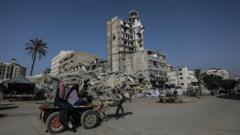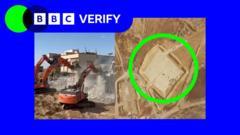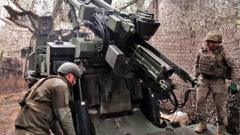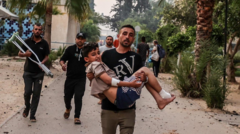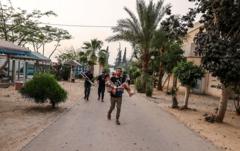Israeli military actions have led to the deaths of at least 80 individuals in Gaza, with hospitals reporting a high number of children among the casualties. The ongoing conflict draws condemnation from the UN, with calls for humanitarian intervention, while Israel defends its operations against Hamas militants.
Escalation of Violence: Israeli Strikes in Gaza Claim 80 Lives
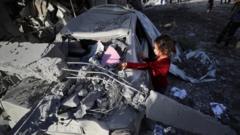
Escalation of Violence: Israeli Strikes in Gaza Claim 80 Lives
Recent Israeli airstrikes in the Gaza Strip have resulted in significant civilian casualties, prompting international concerns regarding humanitarian conditions.
Israeli airstrikes across Gaza have reportedly resulted in at least 80 fatalities, according to local hospitals and rescue agencies. The Indonesian hospital announced that 22 children and 15 women were among the deceased in the northern Jabalia region, where multiple homes were targeted during overnight strikes. Al-Awda hospital reported receiving nine additional bodies, with seven being children.
The Israeli military confirmed that its actions were aimed at Hamas and Palestinian Islamic Jihad fighters in northern Gaza, asserting that it had provided advance evacuation warnings to residents after rockets were launched into Israeli territory. Amidst escalating violence, UN humanitarian chief Tom Fletcher called on the UN Security Council to intervene to prevent potential genocidal actions in Gaza, criticizing Israel for imposing severe hardships on civilians and urging the lifting of the ongoing blockade.
Israeli Ambassador Danny Danon refuted these claims, labeling them as unfounded and asserting that existing aid systems were exploited by Hamas. In Jabalia, residents reported multiple explosions, with videos showcasing the devastation and the grim aftermath. Many families have been devastated, with reports of entire families lost and children killed, as noted by numerous eyewitness accounts.
The director of al-Awda hospital raised alarms regarding the facility's capacity to treat the influx of injured individuals due to severe shortages of medical supplies. Meanwhile, Israeli military sources maintain that they took considerable measures to avoid civilian casualties, justifying their operations against what they describe as deliberate uses of civilian infrastructure by Hamas.
In the wake of these developments, the situation remains dire, with the UN stating that over 20% of Gaza's 2.1 million residents have been displaced, further exacerbating humanitarian crises, including a critical lack of food and fuel. It was reported that more than 60% of community kitchens providing hot meals have shut down due to these shortages.
Despite the severe humanitarian conditions and continued military actions, Israel insists it is compliant with international law regarding aid to Gaza and claims to have facilitated external aid deliveries during previous ceasefire periods. The continued conflict has raised fears of escalating violence, with calls for greater international engagement to address the humanitarian crisis in Gaza.
Additionally, there's a backdrop of hopes surrounding potential negotiations for the release of hostages held by Hamas as some diplomatic discussions unfold. However, Hamas has stated that it will not free remaining hostages unless a ceasefire agreement is reached with Israel. Israeli Prime Minister Benjamin Netanyahu has vowed to continue military offensive operations in Gaza with full force, emphasizing the objective of dismantling Hamas entirely.
With the conflict ongoing and casualties rising, the international community continues to monitor the situation closely, urging for measures to protect civilian lives and secure humanitarian access amidst the violence.








